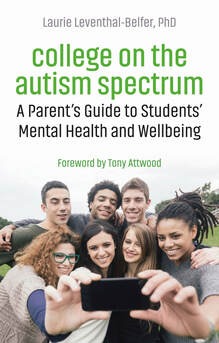|
Laurie Leventhal-Belfer, PhD is a licensed clinical psychologist who specializes in taking a developmental perspective in understanding children, adolescents, adults, and their families as they grapple with daily stresses, medical and mental health issues, challenges adapting to school, interacting with colleagues at work, and making friends.
Dr. Leventhal-Belfer, known as Dr. Laurie to many children and their parents, has a private practice in Palo Alto. She is an Adjunct Lecturer in the Department of Psychiatry and Behavioral Sciences at Stanford University School of Medicine. In addition, she is the founder and was the director of The Friends Program (1992-2024), a therapeutic group program for young children with high-functioning Autism and their parents. Dr. Leventhal-Belfer has developed and taught many professional training courses and has written several books and articles in her areas of expertise.
|
Exciting News!
Dr. Laurie's new book, "College on the Autism Spectrum: A Parent's Guide to Students' Mental Health and Wellbeing", is available to purchase online. |
Dr. Laurie can help you if:
|
Your child:
|
You or your partner:
|

